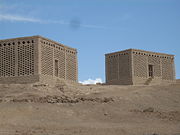Raisin
| Raisins Nutritional value per 100 g (3.5 oz) |
||||||||||||||||||
|---|---|---|---|---|---|---|---|---|---|---|---|---|---|---|---|---|---|---|
| Energy 300 kcal 1250 kJ | ||||||||||||||||||
|
||||||||||||||||||
| Percentages are relative to US recommendations for adults. Source: USDA Nutrient database |
||||||||||||||||||
Raisins are dried grapes. They are produced in many regions of the world, such as the United States, Australia, Chile, Argentina, Mexico, Greece, Turkey, India, Iran, Pakistan, China, Afghanistan, Togo, and Jamaica, as well as South Africa and Southern and Eastern Europe. Raisins may be eaten raw or used in cooking and baking.
Contents |
Etymology
The word raisin dates back to Middle English and is a loanword from Old French; in Old French and French, raisin means "grape," while, in French, a dried grape is referred to as a raisin sec, or "dry grape." The Old French word in turn developed from the Latin word racemus, "a bunch of grapes." The origin of the Latin word is unclear.
Varieties
- See also: Dried vine fruit
Raisin varieties depend on the type of grape used. Seedless varieties include the Sultana (also known as "Thompson Seedless" in the USA) and Flame. Raisins are typically sun-dried, but may also be "water-dipped," or dehydrated. "Golden raisins" are made from Sultanas, treated with Sulfur Dioxide (SO2) , and flame dried to give them their characteristic color. A particular variety of seedless grape, the Black Corinth, is also sun dried to produce Zante currants, mini raisins that are much darker in color and have a tart, tangy flavour. Several varieties of raisins are produced in Asia and, in the West, are only available at ethnic specialty grocers. Green raisins are produced in Iran. Raisins have a variety of colors (green, black, blue, purple, yellow) and sizes.
Regional variations

In the United Kingdom, Australia and New Zealand, the word raisin is reserved for the dried large dark grape, with sultana being a dried large white grape, and currant being a dried small Black Corinth grape.
Nutritional value
Raisins are about 60% sugars by weight, most of which is fructose. Raisins are also high in certain antioxidants, and are comparable to prunes and apricots in this regard. As for all dried fruits, raisins have a very low vitamin C content.
Sweetness

Raisins are sweet due to their high concentration of sugars. If they are stored for a long period, the sugar inside the fruit crystallizes. This makes the dry raisins gritty, but does not affect their usability. The sugar grains dissolve when the raisins are swelled in (hot) water.
See also
- Blackcurrant
- Zante currant
- Redcurrant
- Sultana
- Grape and raisin toxicity in dogs
- Raisin Bran
- Snap-dragon, a Victorian parlour game that involved raisins being plucked from a bowl of burning brandy.
References
- C. D. Wu, J. F. Rivero-Cruz, M. Zhu, B. Su, A. D. Kinghorn (2005). "Antimicrobial Phytochemicals in Thompson Seedless Raisins (Vitis vinifera L.) Inhibit Dental Plaque Bacteria". American Society for Microbiology meeting. June 5–9. Atlanta.
External links
- "Varietal & Nutritional Info". Raisins.org. Retrieved on 2007-04-19.
- The World's Healthiest Foods: Raisins